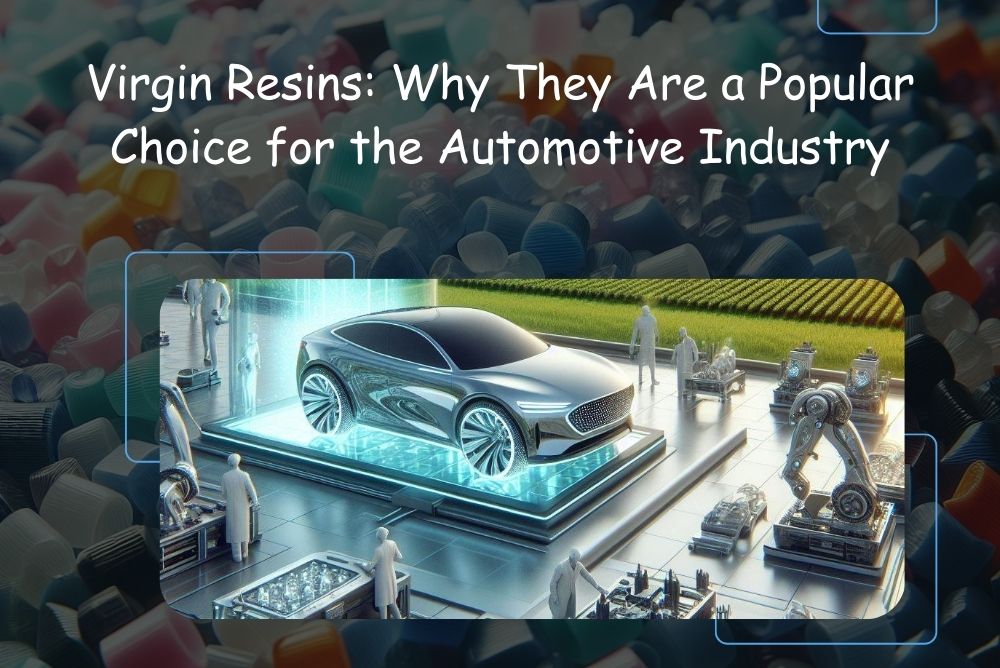Over the years, high-quality plastic resins have transformed various industries by offering materials that match or even surpass the performance of traditional metals in terms of thermal and mechanical properties. This is especially true in the automotive sector, where the use of advanced plastics has led to significant changes in vehicle design, weight reduction, and performance improvements. Among these materials, thermally stable virgin resins have become a go-to choice for manufacturers due to their balance of performance, sustainability, and cost-effectiveness. But what exactly makes them so popular? Let’s dive deeper into the role of virgin resins in the automotive industry, their unique properties, and how they’re shaping the future of vehicle manufacturing. Virgin plastic refers to the purest form of resin, made from raw petrochemical feedstocks like crude oil and natural gas without any prior processing or recycling. Unlike recycled plastics, which may lose some of their original properties, virgin resins retain their full strength and quality. This makes them ideal for applications where reliability and performance are critical. In the automotive world, materials like HDPE, LDPE, LLDPE, and polypropylene are commonly used due to their exceptional durability, structural integrity, and resistance to wear and tear. These properties make them a preferred choice for a wide range of components, from interior panels to under-the-hood parts. Virgin resins are used throughout the automotive industry, playing a vital role in both functional and aesthetic components. Here are some of the most common applications: As the automotive industry continues to evolve, so do the materials used in its production. Researchers and manufacturers are constantly exploring ways to enhance the performance and sustainability of virgin resins. Some of the latest developments include: Despite their many advantages, there are still challenges associated with the use of virgin resins in the automotive industry. These include: The use of virgin resins in the automotive industry has not only improved vehicle performance and safety but also opened up new possibilities for design and innovation. As technology advances and environmental concerns grow, the role of these materials will continue to evolve. For automakers and suppliers looking for high-quality, reliable plastic resins, partnering with an expert like Mid Continent Plastics can ensure access to premium materials that meet the highest standards. Whether you're working on traditional or next-gen vehicles, choosing the right resin is essential for building better, safer, and more efficient automobiles. Connect with a trusted supplier today to explore the best options for your needs.
The vauum forming light box adopts thermoforming processing technology, and is generally made of acrylic PMMA raw materials. Due to the stable quality of acrylic, its products have characteristics such as good transparency, clear farsightedness, high compressive strength, over ten years of non fading, and brightness that cannot be compared to other light boxes and metal characters. It is the preferred product for businesses with sustainable operation and strong strength.
Main application fields of vacuum forming light box:
1. Construction class, such as: window, soundproof door wall, lighting cover, solar collector, telephone booth. Vacuum Forming Light Box,Vacuum Forming Lamp Cover,Vacuum Forming Advertisement,Thermoforming Light Box Dongguan Yiyongli Industrial Co.,Ltd. , https://www.absthermoforming.com
The Power of Virgin Plastic: A Material Driving Innovation
Applications Across the Automotive Sector
Pushing Boundaries: Technological Advancements in Virgin Resins
Challenges in Using Virgin Resins
2. Advertisement display class, such as: lamp box, signboard, indicator, display rack, ball type cover, guide card.
3. Industrial products, such as the panel of instrument and instrument, machine cover and flowmeter.
4. Lighting types, such as: solar lampshades, various shape lampshades used in environmental purification equipment.
5. Civil class, such as: bathroom equipment, makeup stand, photo frame, item rack, gift, souvenir, cold chair, seat back, candy box, reference frame, food cover.
6. Medical class, such as baby incubator, kit, thermostat, operating cabinet.
7. Special purpose classes such as: aircraft, yacht and car Windows and windshield, submarine and trench with periscope.